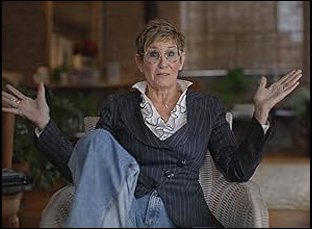It turned out to be a bit of a blessing for Matt Tyrnauer that James Carville was a late bloomer as a political consultant, only claiming his first major campaign victory at age 42 when he helped guide Bob Casey’s bid for governor of Pennsylvania, facing both tall odds when Casey ran against well-liked Republican lieutenant governor William Scranton and the fact that since entering politics in the 1970s, winning was elusive. This wasn’t true only for himself, but for the Democratic Party as a whole during the rise of Ronald Reagan and while that president’s conservative administration encouraged a young Tyrnauer to become active as a volunteer, he ultimately didn’t see himself moving forward with it as a full-time job as he had at one time thought he might, instead pursuing a path in journalism that would lead him to become a features writer at Vanity Fair.
“When I was young and fascinated with politics, [it was to] the extent that I was trying to work in it and even contemplating it as a career, which I quickly abandoned when Democrats couldn’t win,” says Tyrnauer, who observed from afar how Carville and Paul Begala, who first worked together on Texan Lloyd Doggett’s failed 1984 Senate bid, turned the fortunes of the entire party around with the election of President Bill Clinton eight years later. “And I thought journalists were much more amusing than politicians or politicos, except for James Carville, though I still thought that closed universe of the campaign was endlessly fascinating.”
That ended up being a win-win for everyone when Carville restored faith that voters could still be swayed to support progressive candidates and Tyrnauer would turn to filmmaking as a way to continue to author rich and lively profile pieces about the powerful, launching an entire subgenre with his successful 2008 fashion doc “Valentino: The Last Emperor” and examining hidden power structures with “Where’s My Roy Cohn?” “Scotty and the Secret History of Hollywood” about the pimp Scotty Bowers and the Jane Jacobs biography “Citizen Jane: Battle for the City.” (He even would get a final word in on “The Reagans,” his 2020 miniseries about how the couple maintained the illusion of Ronald’s capabilities as he suffered from Alzheimer’s.)
Their two paths have finally crossed with “Carville: Winning is Everything, Stupid,” nodding to the famous line the famously street savvy consultant gave to Clinton during the 1992 campaign, and while Tyrnauer could reasonably expect he was going to make a largely retrospective piece about how Carville lit a fire within the Democratic Party to fight for the values they hold dear, he couldn’t imagine being on hand to see history being made as the influence Carville still holds helped facilitate the end of President Biden’s reelection bid in this year’s presidential race, giving the party a chance to beat Donald Trump when it looked like they had none.
Although a first test screening of the film occurred the night that Biden’s disastrous debate appearance set his early exit into motion, Tyrnauer had all the footage already from accompanying Carville for the previous year to see him lay the groundwork for the largely unprecedented shift for a major party candidate so late in the proceedings and while Carville hadn’t worked for any individual candidate for some time, the director is able to show how he’s kept his ear to the ground and his hand very much in Democratic Party affairs, earning respect from all corners and able to wield considerable influence. “Carville: Winning is Everything” would be worthwhile only for that, but when Carville was able to parlay his punchy personality and “The Odd Couple” appeal of his marriage to Republican consultant Mary Matalin into a thriving business as a pundit, it’s no surprise that a reflection on the life that brought him here is more entertaining than most, recounting how he “discovered air conditioning and masturbation at around the same time” growing up in Louisiana and demonstrating how the commitment to straight talk he learned there and then helped him become a continually relevant voice in American politics.
With campaign season in full swing, “Carville: Winning is Everything, Stupid” is waging one on two fronts as there’s a president to elect and an Oscar potentially to be won and after the film premiered at Telluride, it is now getting a national theatrical release. Recently, Tyrnauer spoke about he ended up getting such a remarkable window into this campaign cycle and into Carville, as well as why we shouldn’t dare call the film “a portrait” and luring his partner Matalin into the picture after she’s largely retreated from the spotlight.

I’ve always been interested in politics and I’ve always thought James Carville was an interesting, significant player. He’s the featured persona in “The War Room,” a very famous film from the early ’90s, but that’s more than 30 years ago and he’s remained a household name for all those decades. He’s not an elected official, he’s not a Washington lawyer, he’s a political genius, and the ultimate freelance politico and little did I know when I started making the film that he would become a gigantic player in the 2024 election cycle with a very lonely campaign for many months to persuade President Biden to step aside and allow someone else to be the standard bearer of the party, which has virtually never happened before and certainly not in this way and for these reasons.
This may be a chicken and the egg question, but I’ve always admired how your biographies have spoken to the moment and I think the assumption is that your immediate interest is in the person, but how much does the time that you’re making the films in actually influence who you want to pursue a film about?
It is both. If you’re working on a cinema verite film about someone who’s alive and still going strong, you want an active storyline. Otherwise, it becomes a little too retrospective and a little too nostalgic, although there’s a time and a place for nostalgia. I actually like some nostalgia, to be honest, but I don’t think I’d make a fully nostalgic film. And it’s funny when you go around talking about ideas with studios and streamers, the ’90s have been a real touchstone of interest for years now. This happens to be one [of those] in part because Carville, after decades of failure professionally, exploded onto the scene in the late ’80s and early ’90s as a game-changing political consultant and strategist who really redefined the art of political consulting. And then he became a household name, and in some ways famous for being famous, almost like a proto-Kardashian in that sense, but with a lot of substance and this is the reason I wanted to make the film.
Carville is a political genius, and he still has many platforms – he has his own podcast, The Baltic Forum. He has a perch on MSNBC and CNN, and News Nation, and he’s on everyone else’s podcast, and he’s called for quotes by the major political press all the time. He’s a player, but a covert player in some ways because people don’t recognize him as the elder statesman of the Democratic Party, which I think this film makes the subtle case that he is. Nancy Pelosi is technically that because she’s an elected official, but James is unique in that he has respect, acknowledged brilliance, and knows how to play the game, so his voice is listened to and heard. When he said in the spring of 2024 that Biden was going to potentially lose badly because he was too old in the public’s eye to be reelected, no one really was listening, or they were telling him to be quiet about it, which was an interesting thing that I covered in this. But then you see how the tables turn when the Trump-Biden debate happened, and we were still filming – we were wrapping up editing at that time, and I had to scramble and change the entire back end of the film to accommodate that, but it really amounted to a victory for James, in that his point got across and he moved the needle politically.
You get a perfect introduction for that type of film when it makes clear it’ll be active rather than a look back as he’s running through hallways at hotels, trying to get his exercise. How did you literally find a way to get this film off on the right foot when you don’t typically see that for a figure like this?
What you’re describing is something I don’t think I’ve hardly ever had in a film I’ve done, which is a title sequence. But it’s really more than that. It was an idea I had, which is based on something I learned about James, which is that he’s a daily jogger. Other people mentioned that he more walks or speed walks than run, but he called it “hotel hall running” and he’ll go to his favorite type of hotel, which is an atrium lobby hotel, like imagine a big Hyatt Regency, [which are] designed by an architect named John Portman. They’re iconic with the glass elevator and all that, and when I knew [Carville] did that, I said “we’ve got to go hotel hall running with you, so we found a Hyatt Regency and he did his thing. And the architecture in these hotels is so monumental and so photogenic that we shot it as a scene with real scope and multiple camera angles and it has a majestic score with it. It works really well as the opening of the film because you get the eccentricity of Carville, which is genuine and he does run every day or speed walks, and we intercut it with sequences to set up the film a little bit.
In general, the structure is quite exquisite as it is in all your films where you’ll build around pivotal points in someone’s life where you’ll understand the influences on that particular moment, but you don’t dump a lot of biographical information upfront. How’d you figure out what would work best here?
I just don’t like that chronological form, and sometimes it’s not a bad idea to start at the beginning, but I just think that to mix up the timeframes is something that cinema allows you to do and it’s more interesting if you take advantage of that. I started as a long-form magazine journalist and a trick I learned in magazine writing is don’t start with “James Carville was born in…” – like a biographical format. When people refer to this as a “portrait of Carville,” I actually would reject that view. It’s a cinema verite film about something. Yes, it’s about a guy, but I think it’s about politics and strategy and the human condition and what’s more important than power and how to use power and to express those themes and not make this a biographical film, actually going back and forth between sequences and wrapping the present day with the past through cutting and montage is the key element. And Ryan Rothmeier, the editor of this film, worked really hard on that structure along with Dan Crane, who’s one of the producers on it, to make it a really complicated, layered piece that gives a linear story of a person.
I’d agree and I’ve heard Carville say you were one of the only people who could pull this off, which I’d also agree with, but part of his rationale is the experience you had in political campaigns to give this the right energy. Is that actually history you could draw on?
Yeah, it’s funny. When I was kind of a kid, I loved politics and I was a gopher in political campaigns. I was what one would have called it a page boy at a certain time in history. When I was 15, I was on the floor of the Democratic convention in San Francisco and I loved all that – the romance of it, hearkening back to a different era before I was born with the broker convention and the L.A. convention of Kennedy and Johnson and the ’68 convention in Chicago. A lot of great literature came out of that. Norman Mailer wrote a book, “Miami and the Siege of Chicago.” Gore Vidal and William F. Buckley had their famous debates in ’68. [Timothy Crowe’s] “The Boys on the Bus” was an iconic book, and then all of the political books of the ’90s, and of course, “The War Room,” which was an iconic political film with Carville and Stephanopoulos that captured something about the political universe and what was called “the bubble” by Richard Ben Cramer in [his book] “What It Takes,” [as in] the bubble of the political campaign because you’re in this world. That’s another theme of my films is to examine the closed universe, and the campaign is perfect for that. You insert yourself into the bubble, and it’s a world within a world and you tell people how the world works.

I love the way you put that – “finally understand the marriage” because for those who weren’t alive in the early ’90s or weren’t paying attention, they were so famous as a politically discordant couple and were on TV as almost Tracy/Hepburn, point-counterpoint real-life spouses, these amazing political characters. The origin of this was the ’92 campaign where he ran the Clinton campaign and she was very high up in the George Herbert Walker Bush campaign for re-election and he won and she lost and then they wrote a blockbuster best-selling campaign memoir called “All’s Fair,“ which was a mega bestseller. People became obsessed with this marriage because I think it held a mirror up to a lot of other marriages that were politically discordant.
Mary had disappeared a bit from the scene over the past few decades, but when I talked about the film with friends, they remembered they were passionate [and wondered] what was with that marriage? Were they hustlers with it? Why were they so public about it? There was just a lot of pent-up emotion about this narrative of a marriage and the depiction in the public that was unresolved, so I did ask Mary to be in the film and she didn’t want to be in the film for various reasons. I had to convince her to be in the film and boy, is she ever in the film [now]. If you’re wondering what was up with Carville and Matalin, are they still together? The answer is yes, but if you want to know more about what made that marriage hold up, watch the film.
Was there anything that happened that changed your own ideas of what this was?
Undoubtedly when in May of 2023, an ABC News/Washington Post poll came out that Trump would beat Biden badly in a hypothetical matchup more than a year from the election when neither had been nominated yet. And Carville says in the film, “That knocked me off my horse.” He saw in that poll that Biden had tremendous headwinds, and he never let go of that belief that a sitting president who was running for re-election was going to have to step aside. And it was he alone who bravely went out and campaigned against a man he admires, but for the good of the country and the good of the world, because he thinks that if Trump wins, the Western alliance is going to end, and that the Constitution, he literally says, is doomed. He put his words and his platforms to use, so the film pivots as he pivots away from just being a political analyst and an incredibly colorful character into a consequential figure in the 2024 race.
“Carville: Winning is Everything, Stupid” opens in Los Angeles on October 25th at the Laemmle Royal and will continue open at theaters across the country this fall. A full list of theaters and dates is here.




